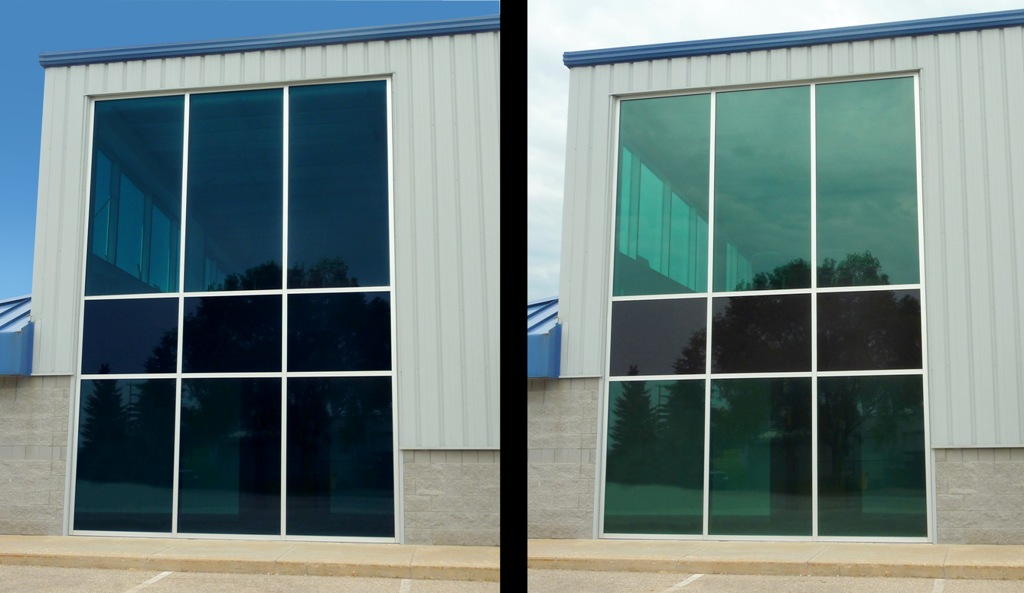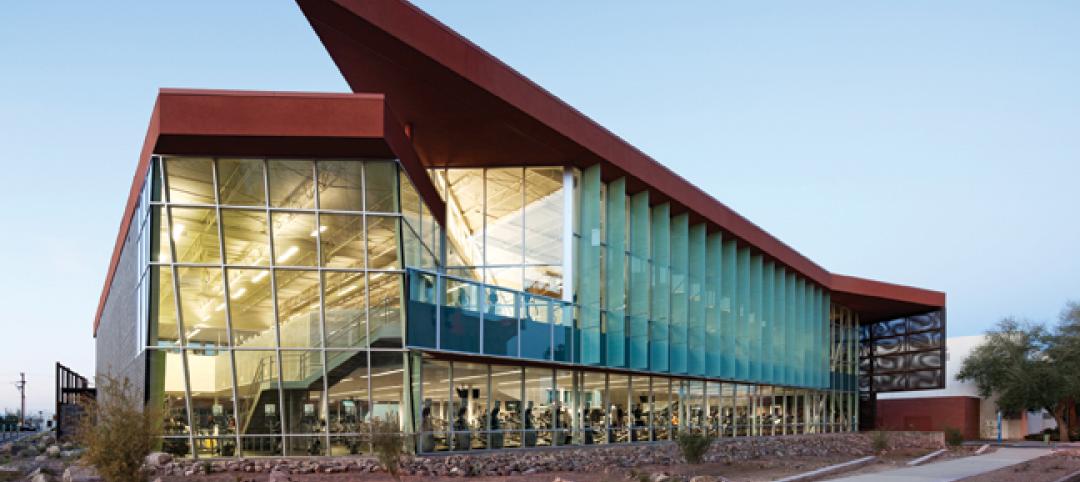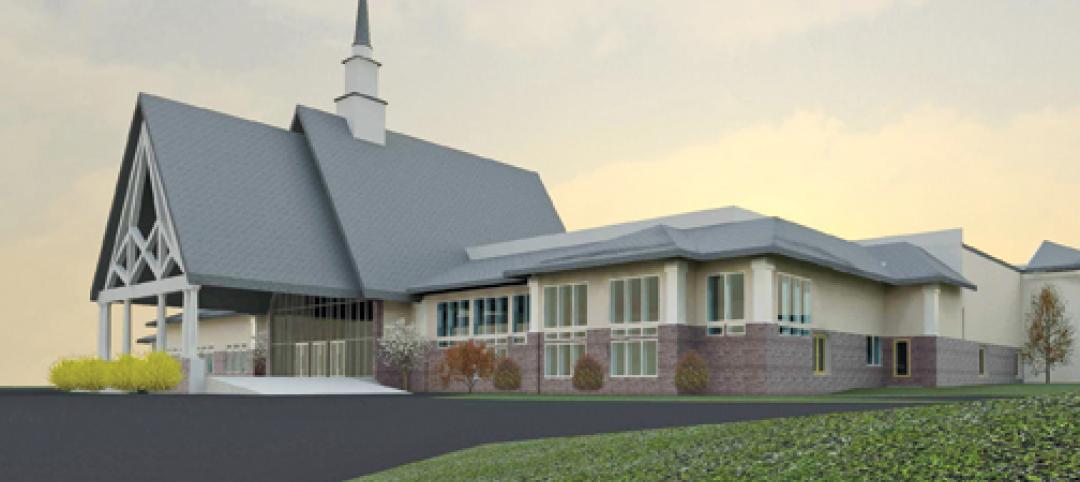PPG Industries and Pleotint, LLC, have agreed to jointly market a commercial window glass system that combines Sunlight Responsive Thermochromic, or SRT, interlayer technology by Pleotint, with Solarban low-emissivity (low-e) glass and other glasses by PPG to control solar heat gain and reduce energy costs in buildings.
Pleotint’s patented technology is a lightly tinted thermochromic interlayer that warms up and darkens in direct sunlight, but clears in indirect sunlight to allow light to pass into a building. Laminated between two lites of glass, SRT interlayer may be used monolithically or within an insulating glass unit. Visible light transmittance for windows with SRT interlayer adjusts through the day without the need for wiring, power supplies or controls.
When the SRT interlayer is combined in a window system with Solarban glass, a proven solar control, low-e glass that also blocks solar heat and transmits visible light, these adaptive windows can dramatically reduce the amount of energy required to cool buildings. Because the windows clear up in indirect sunlight, they also decrease the need for artificial lighting.
A study showed that, due to its ability to dynamically adjust to natural lighting conditions, a window system including an SRT interlayer can reduce energy costs in commercial buildings by 17 to 30% over industry-standard window systems. A window with SRT technology also reduces the transmittance of ultraviolet light and short-wavelength visible light, which are major contributors to fading in carpets, fabrics, artwork, photos and other materials.
Unlike competing dynamic windows that require manual, electrical or mechanical controls, windows with the SRT interlayer use the sun’s own energy – up to 1,000 watts of power per square meter – to adjust the window tint and transmittance level. Because the process is entirely self-sustaining, the SRT interlayer system not only uses less energy, it also eliminates the opportunities for failure due to faulty wiring, poor connections or broken electrical circuits. Windows with SRT interlayers also have passed exposure and durability testing developed for electrochromic windows and conducted by the National Renewable Energy Laboratory (NREL).
Insulating units with SRT interlayers and Solarban low-e glass are available in sizes up to 5 feet wide and have been laminated in lengths of up to 11 feet. Architects may specify any Oceans of Color tinted glass or Earth and Sky high-performance tinted glass by PPG as a base-state window color. BD+C
Related Stories
| Nov 9, 2010
Designing a library? Don’t focus on books
How do you design a library when print books are no longer its core business? Turn them into massive study halls. That’s what designers did at the University of Amsterdam, where they transformed the existing 27,000-sf library into a study center—without any visible books. About 2,000 students visit the facility daily and encounter workspaces instead of stacks.
| Nov 9, 2010
Turner Construction report: Green buildings still on the agenda
Green buildings continue to be on the agenda for real estate owners, developers, and corporate owner-occupants, according to the Turner 2010 Green Building Market Barometer. Key findings: Almost 90% of respondents said it was extremely or very likely they would incorporate energy-efficiency improvements in their new construction or renovation project, and 60% expected to incorporate improvements to water efficiency, indoor environmental quality, and green materials.
| Nov 5, 2010
New Millennium’s Gary Heasley on BIM, LEED, and the nonresidential market
Gary Heasley, president of New Millennium Building Systems, Fort Wayne, Ind., and EVP of its parent company, Steel Dynamics, Inc., tells BD+C’s Robert Cassidy about the Steel Joist Manufacturer’s westward expansion, its push to create BIM tools for its products, LEED, and the outlook for the nonresidential construction market.
| Nov 3, 2010
First of three green labs opens at Iowa State University
Designed by ZGF Architects, in association with OPN Architects, the Biorenewable Research Laboratory on the Ames campus of Iowa State University is the first of three projects completed as part of the school’s Biorenewables Complex. The 71,800-sf LEED Gold project is one of three wings that will make up the 210,000-sf complex.
| Nov 3, 2010
Park’s green education center a lesson in sustainability
The new Cantigny Outdoor Education Center, located within the 500-acre Cantigny Park in Wheaton, Ill., earned LEED Silver. Designed by DLA Architects, the 3,100-sf multipurpose center will serve patrons of the park’s golf courses, museums, and display garden, one of the largest such gardens in the Midwest.
| Nov 3, 2010
Public works complex gets eco-friendly addition
The renovation and expansion of the public works operations facility in Wilmette, Ill., including a 5,000-sf addition that houses administrative and engineering offices, locker rooms, and a lunch room/meeting room, is seeking LEED Gold certification.
| Nov 3, 2010
Sailing center sets course for energy efficiency, sustainability
The Milwaukee (Wis.) Community Sailing Center’s new facility on Lake Michigan counts a geothermal heating and cooling system among its sustainable features. The facility was designed for the nonprofit instructional sailing organization with energy efficiency and low operating costs in mind.
| Nov 3, 2010
Seattle University’s expanded library trying for LEED Gold
Pfeiffer Partners Architects, in collaboration with Mithun Architects, programmed, planned, and designed the $55 million renovation and expansion of Lemieux Library and McGoldrick Learning Commons at Seattle University. The LEED-Gold-designed facility’s green features include daylighting, sustainable and recycled materials, and a rain garden.
| Nov 3, 2010
Recreation center targets student health, earns LEED Platinum
Not only is the student recreation center at the University of Arizona, Tucson, the hub of student life but its new 54,000-sf addition is also super-green, having recently attained LEED Platinum certification.
| Nov 3, 2010
New church in Connecticut will serve a growing congregation
Tocci Building Companies will start digging next June for the Black Rock Congregational Church in Fairfield, Conn. Designed by Wiles Architects, the 103,000-sf multiuse facility will feature a 900-person worship center with tiered stadium seating, a children’s worship center, a chapel, an auditorium, a gymnasium, educational space, administrative offices, commercial kitchen, and a welcome center with library and lounge.
















